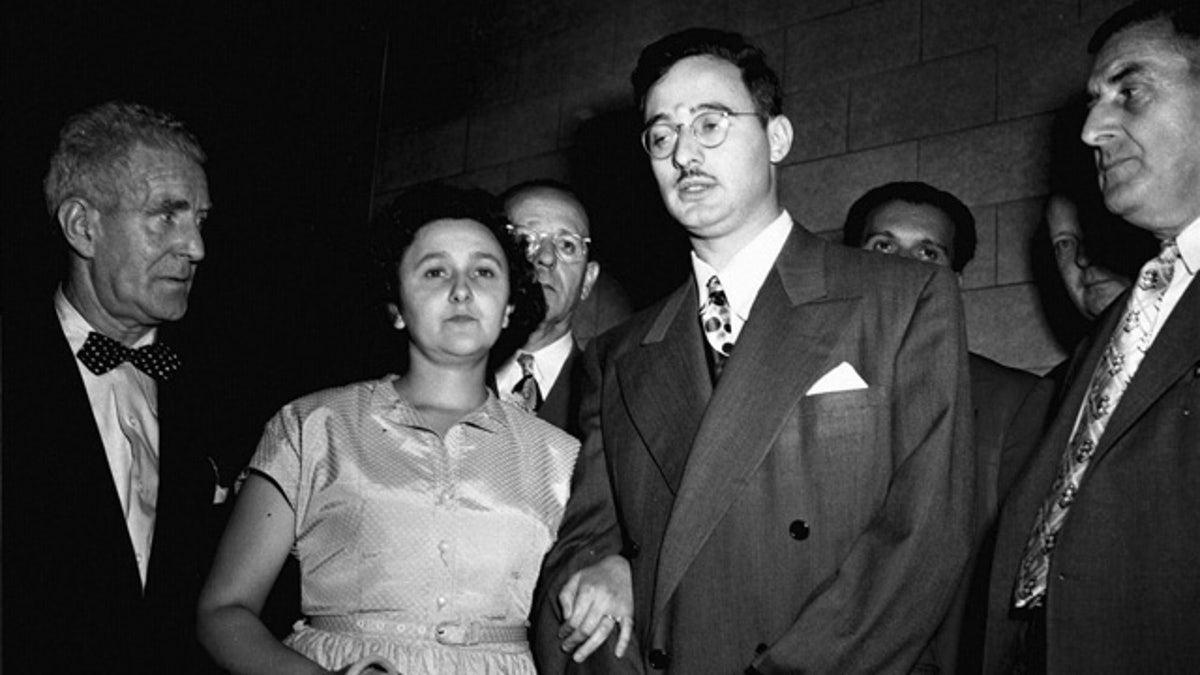
In this 1951 file photo, Ethel and Julius Rosenberg are shown during their trial for espionage in New York. (AP/File)
A group of New Jersey law students claim to have uncovered bombshell new evidence in one of the most infamous espionage cases of the 20th century, including an FBI document they say may indicate an innocent woman was executed.
The case is about Julius and Ethel Rosenberg – American citizens executed in 1953 for passing atomic secrets to the Soviet Union. Since then, evidence has appeared to confirm that Julius was a spy, but his wife’s role has long been disputed. Students from the Seton Hall University School of Law Center for Policy & Research took up the case, and started from the beginning, said Professor Mark Denbeaux.
“I never wanted to re-litigate the case,” author of the report, Seton Hall Law Professor and Director of the Center for Policy & Research Mark Denbeaux told FoxNews.com. “The point was to do what law students should learn to do: go back to the evidence and find out what is there –then work our way back and see how it evolved.”
What they found was that Ethel Rosenberg may have been charged merely to squeeze a confession out of her husband, a dramatic development that affirmed the old suspicions of Denbeaux’s father, the son of George Patton’s combat chaplain. The elder Denbeaux, who helped liberate two concentration camps, always believed that Ethel Rosenberg’s execution was tied to her religious beliefs.
“My father always assumed the Rosenbergs wouldn’t have been executed if they weren’t Jewish,” Denbeaux told FoxNews.com. “If they were waspy Protestants, this wouldn’t have happened.”
The Seton Hall Law Center uncovered an internal FBI memo dating July 17, 1950 that determined there was “insufficient evidence” to arrest Ethel Rosenberg, but that she could be used as “a lever against her husband” to pressure him into confessing. According to the report, additional documents from the FBI and Department of Justice repeatedly note the absence of evidence implicating Ethel in the conspiracy.
The project also discovered that in January of 1951, an assistant attorney general informed a Congressional Committee that Julius Rosenberg was a “tough nut to crack” and that authorities needed to “severely threaten Ethel in order to make Julius cooperate.” This prompted prosecutors to develop evidence in the form of “continually evolving” witness statements, which ultimately led to Ethel’s execution, according to the students’ report.
The prosecutor told lawmakers Julius Rosenberg was “the keystone to a lot of other potential espionage agents,” and that “if we can really break him, that he will open the gates and give us information which would lead to a lot of other individuals.” The Assistant Attorney General reportedly informed the Committee that it was “important” that Julius be “under the shadow of a death penalty,” which “is about the only thing you can use as a lever on these people.”
The investigation concluded that the U.S. government’s case against Ethel Rosenberg was “basically non-existent.”
“When we began, all of us assumed that Ethel could not have been executed with so little evidence. By the end we all realized that her execution (and probably her conviction) was not the result of evidence but because of the prosecution’s failed gamble against Julius,” Research Fellow and co-author of the report Elizabeth Mancuso said in a statement. “The government’s manipulation of familial relationships to secure a conviction is just as disturbing today as it should have been 60 years ago.”
The Rosenbergs’ sons, who have long sought to clear their parents’ names, are hoping for a proclamation from President Obama to exonerating their mother in the last days of his term. They hope the scholarly report will give their effort a push.
“The report is supportive of the argument we’ve been making for over 40 years and I’m impressed with the work the law students have done,” son Michael Meeropol told FoxNews.com.
Meeropol said he and his brother, Robert, believe the government took their mother as “collateral damage.”
“The government took her as a hostage, and they did what terrorists do all the time –they kill the hostage,” Meeropol said.
Earlier this month, White House Press Secretary Josh Earnest was asked in a briefing on the status of the proclamation.
“I’m sure we’ll take a look,” Earnest said in a briefing, and that he was “not aware of any work that has been done thus far” on the brothers’ request.




















